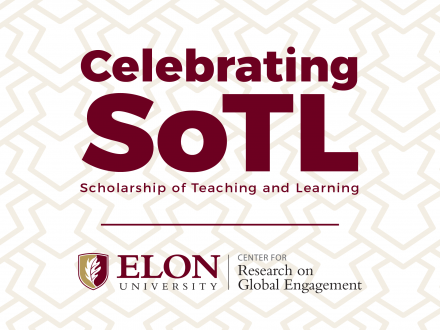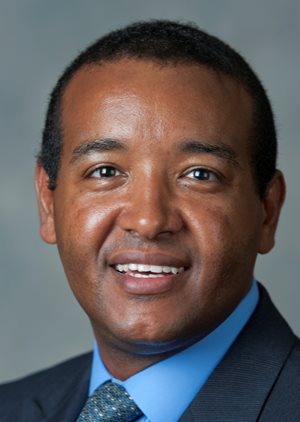Today we feature a story on Mussa Idris who is one of seven Elon faculty co-authors who recently published SoTL work in the article "Undergraduate research in the global context: models and practices for high-quality mentoring". You can read more about his story, SoTL processes, and collaboration with the Center for Research on Global Engagement below.
Each spring, the Center for Engaged Learning (CEL), the Center for the Advancement of Teaching and Learning (CATL), and the Center for Research on Global Engagement (CRGE) join together to showcase research projects focused on the Scholarship of Teaching and Learning (SoTL). Follow along this week as we share Elon scholars’ research on innovative teaching practices through a series of Today at Elon articles.
Have you ever wondered how teachers know how to, or decide to, teach their classes or where did this assignment come from? Have you ever tried teaching someone something and considered, “who thought of doing this, this particular way” or “I wish this could be done differently”? At higher education institutions, Scholarship of Teaching and Learning (SoTL) work is used to reflect and research teaching practices in order to relate, identify, or discover best practices.
 Many SoTL projects don’t begin as identified SoTL work, but rather evolve from disciplinary research that intertwines with student learning outcomes. Such is the case when looking at the work over the last few years of Mussa Idris, an associate professor of anthropology and one of seven Elon faculty co-authors who recently published SoTL work in the article “Undergraduate research in the global context: models and practices for high-quality mentoring.”
Many SoTL projects don’t begin as identified SoTL work, but rather evolve from disciplinary research that intertwines with student learning outcomes. Such is the case when looking at the work over the last few years of Mussa Idris, an associate professor of anthropology and one of seven Elon faculty co-authors who recently published SoTL work in the article “Undergraduate research in the global context: models and practices for high-quality mentoring.”
Idris is a cultural and applied anthropologist. He’s taught undergraduate classes in anthropology, sociology and African studies for more than a decade now. When talking to Idris about his time at Elon and the variety of programs that help to morph his research work into published SoTL work, there seemed to be a common thread among all his stories of “curiosity”.
While Idris can often be seen on campus teaching courses such as Culture & Business, Qualitative Research Methods, and Anthropological Theory, his research allows him to be involved beyond the classroom in local and global communities. His ongoing research project works with immigrants in Greensboro in partnership with a refugee resettlement agency to better understand the adjustment processes that refugees go through when first arriving in North Carolina. The refugee populations Idris works with come from over 20 different countries.
Idris describes his research work as having an “ethnographic focus”, where ethnography is the study of a group of people in their own environment through activities such as observation and interviews, and he uses ethnographic methods to better understand the challenges and opportunities of both the refugees and the resettlement agency workers.
“I am interested in the question of integration of refugees and immigrants who are new to the area,” Idris says when talking specifically about his experiences in Greensboro. “So, in my qualitative research methods class, I introduce the students to my research practice. At least one of them became more curious about observing my work.”
Idris says “at least one,” but there have been many students he has mentored or co-mentored outside of the normal classroom experience after they’ve taken one of his courses. Two of these students offer early examples of students with curiosities in his ethnographic methodology practice after taking his qualitative research methods class (Leena Dahal ’17 and Josephine Gardner ‘17). Work with these students started with them observing Idris at the resettlement agency and blossomed into collaborative research where the students and their ideas directly impacted Idris’ work and research.

“[Leena] expanded my curiosities from my initial interest in East and Central Africa to include South Asia,” Idris says. “I always engage students in the design process of the research and community engagement in such a way that they can learn from a real-world experience. The students get to learn how to design a research question, they have ethical research training, get training on cultural orientation, learn how to engage with people who work at the resettlement agency, and even just meet people who are coming from an international setting to Greensboro. For example, we started to invite refugee families to campus activities like college coffee and have students visit with families. The practice is for them to observe then, from those experiences, develop their own research – it’s a scaffolded introduction that can allow students to later participate in the development of their country.”
(Learn more about Leena’s research or Josephine’s research (pgs. 23-37))
It is clear that Idris’ mentoring experiences have shaped some of his pedagogy practices and his anthropology mindset directs his focus on bettering student interactions in an applicable way. One pedagogy change he mentioned was simply changing some of the examples he gives in class so that they were more applicable to Elon students and warranted more active engagement in class. He wants his examples to be relatable and allow students to understand how something like ethnographic methods can be applicable to their lives.
Reflecting on his early teaching days, Idris says that he expected to train students in traditional ethnographic methods and that’s how he started. However, after coming to Elon and thinking about “the Elon context,” he credits the “Elon Teacher-Scholar Statement” as the guide to the culture at Elon, one where the classroom is engaged and faculty are dedicated to modeling and sharing their knowledge through activities like high-quality undergraduate research mentoring. For him, the ability to mentor students at a high-quality level “came later on as a result of learning experiences.”
Idris’ learning experiences at Elon and through his research are extensive and he didn’t seem to leave anything uncredited. In addition to groups already mentioned, Idris included many other programs and groups: the Honors Thesis Committee (member), Spring Undergraduate Research Forums (SURF), Summer Undergraduate Research Experiences (SURE), the Lumen Prize Program, the National Conference for Undergraduate Research (NCUR), Multi-Faith Scholar program (mentor), Provost Scholar (mentor), South Asia Research Group at Elon (SARGE), Elon’s Program for Ethnographic Research and Community Studies (PERCS), the Center for Advancement of Teaching & Learning (CATL) Grant (awardee), Elon College – the College of Arts & Sciences (CAS), and the Center for Leadership.
In thinking about the different influences Idris’ had, he credits his collaboration with the Center for Research on Global Engage (CRGE) and joining a CRGE Community of Practice (CoP) on undergraduate research mentoring practices as the turning point in his research that added the layer of SoTL to his disciplinary work.
“What the CoP allowed was for me to focus on mentoring practices…reflection in collaboration with colleagues who are also doing the same work…allowing us to develop our own mentoring models and just get published this year in 2022,” Idris says.
SoTL work is important and benefits current and future faculty alike. Hopefully, Idris’ story is a reflection of that and surely something to celebrate. If your own curiosities are peaked and you’d like to learn more about some of the mentoring practices that came out the CoP that Mussa Idris was a part of, please use the link below to read the full article. If you are interested in learning more about the CRGE, their current CoPs, or other programs they facilitate, please visit their website at: https://www.elon.edu/u/academics/crge/.
Recently published work co-authored by Mussa Idris and cited in this article:


